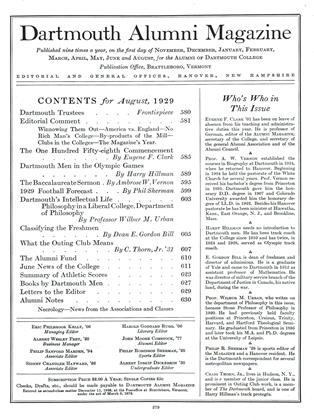Pres. Hopkins addressed the valedictory to the class of 1929 at the Baccaulaureate exercises in Rollins Chapel, Sunday, June 16. The valedictory follows: Men of 1929: Now, in the manner of an ancient ceremonial, we join in fellowship for consideration of what is the spirit of the manhood which is ours.
The dictum of the founders of our historic colleges decreed that religion needed the support of higher education. No perspicacious observer of our colleges today could escape conviction that higher education needs religion. Only so, can wholeness or holiness be given to the lives of individual men. Either education or religion unsupplemented by the other is insufficient for man and may become barren.
I am not unconscious that undergraduates, as well as others, genuinely eager to accept this declaration, yet often find it difficult. Some arrive at conviction that the claims of the two are mutually exclusive. Organized religion in its solicitude to acquire strength has largely sought to base itself upon fixed authority which could coerce submission and acceptance. It has failed to acknowledge that the wisdom of ancient prophets though great might .still be incomplete and that the utterances of sacred documents, important as they were, might yet have frozen the virtues of a by-gone age against progressive development for the wants of future times. Meanwhile, education has sought freedom to examine and to judge the values of old dogmas in comparison with newly developing needs of mankind through succeeding eras. It has further insisted that not all, and sometimes not much, done in the name of religion was invariably religious. It has held that in the realities of problems of contemporary life,—its complexities, the adjustment of the individual to the group, and of groups to one another—lay requirement that religion must change and grow in dimensions and in power to render its sufficient service to mankind. Thus a specious incompatibility has been made to appear where incompatibility does not exist.
As truly as the Sabbath was made for man, and not man for the Sabbath, so was religion made, that the spirit of man might be sweetened and beautified and ennobled in whatsoever circumstances it might be placed. If, in our Dartmouth years together, our minds have been given or have found right guidance, our spirit will have become imbued with a consciousness of what constitutes true nobility and exalted with aspiration to attain to this. Herein is the essence of religion.
If, in retrospect, we find such tendencies to have been operative and to be enduring, we may count the processes of our education, self acquired or imposed, to have been good. If we find such influence to have been missed, pray God in days to come we may feel our lack and may acquire sense of relative values which shall lead us like the scriptural merchantmen, seeking goodly pearls, when we have found the one pearl of great price to go and sell all that we have and buy it.
In the chapel of Balliol College at Oxford there is an inscription commemorative of a beloved and respected scholar of that college who lost his life on Mont Blanc. It reads, in part: "He loved great things and thought little of himself." Such I conceive to be the spirit of the truly religious man. May it prove to be our spirit!
 View Full Issue
View Full Issue
More From This Issue
-
 Class Notes
Class NotesCLASS OF 1879
August 1929 By Henry Melville -
 Article
ArticleAlumni Council Meetings
August 1929 -
 Article
ArticleThe One Hundred Fifty-Eighth Commencement
August 1929 By Eugene F. Clark -
 Class Notes
Class NotesCLASS OF 1899
August 1929 By Warren C. Kendall -
 Class Notes
Class NotesCLASS OF 1903
August 1929 By John Crowell -
 Class Notes
Class NotesCLASS OF 1918
August 1929 By Frederick W. Cassebeer
Article
-
 Article
ArticleNATIONAL COUNCIL OFFERS FELLOWSHIPS IN RELIGION
March, 1924 -
 Article
ArticlePhi Sig Goes Local
May 1956 -
 Article
ArticleRequired Reading
JUNE 2000 -
 Article
ArticleA Basic Home Reference Library for the College Graduate
DECEMBER 1962 By LAWRENCE CLARK POWELL -
 Article
ArticleSQUASH
December 1936 By ROBERT A. SELLMER '35 -
 Article
ArticlePost-Grad Hockey
March 1939 By Robert Webb '34.


